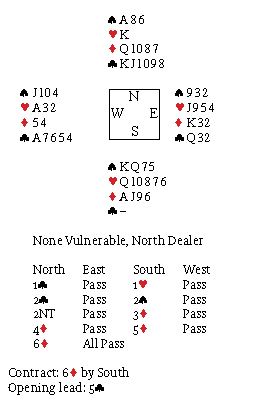 Contract: 6
Contract: 6Why You Lose at Bridge By Barnet Shenkin
Why You Lose at Bridge By Barnet Shenkin …
One of Bridges all time classic books is “Why You Lose at Bridge” by S J Simon. First published in 1945 my wife Maggie has a 1952 copy which she borrowed from a friend some time ago, and found its way into our bridge library. The book is written in a humorous style, and while the bidding only resembles slightly th e bidding of today, it contains many gems of advice which still hold good in the game today. Contract: 6
Contract: 6 by South
Opening lead: 5
by South
Opening lead: 5 West, the unlucky expert pondered his lead. It looked poor prospect for defense, with spades breaking and any trump finesse working. His
West, the unlucky expert pondered his lead. It looked poor prospect for defense, with spades breaking and any trump finesse working. His  A would not stand up as declarer had likely void. He decided to try and help partner’s trump holding by possibly getting declarer to ruff in hand. He led the
A would not stand up as declarer had likely void. He decided to try and help partner’s trump holding by possibly getting declarer to ruff in hand. He led the  5!
Declarer quickly followed with the
5!
Declarer quickly followed with the  J, and East after some thought played the
J, and East after some thought played the  Q to the relief of her partner. Declarer now led a heart and West won the Ace and played the
Q to the relief of her partner. Declarer now led a heart and West won the Ace and played the  A forcing declarer to ruff a second time and in doing so making his partner’s trump King secure from capture.
However declarer now crossed to the
A forcing declarer to ruff a second time and in doing so making his partner’s trump King secure from capture.
However declarer now crossed to the  A and played the
A and played the  Q which East covered with the King. It was easy now to win, cash a high trump and cross to dummy with a heart ruff, pull the last trump, and d aim the slam. East had followed the principle she had learned of covering an honour with an honour.
Simon showed there is no point of course in covering unless you can promote something in your hand, or that in your partners. Here that was not possible. My own advice to share is that bridge is not a game of rules and the words “never do” should be deleted from all text books.
Every hand is different, and all the student has rough guidelines which are for adaptation. I had a good friend, the late Irving Rose, a very fine bridge player. Holding 8 times in the trump suit to the AK x (x) in dummy and missing the Q he would lead the J and usually play the AK if his opponent did not cover.
He was often a winner and brought home games that the normal finesse play would fail. Of course this depended on the caliber of the opponents. If you can get a copy of Simon’s now reprinted book it is well worth the read.
Q which East covered with the King. It was easy now to win, cash a high trump and cross to dummy with a heart ruff, pull the last trump, and d aim the slam. East had followed the principle she had learned of covering an honour with an honour.
Simon showed there is no point of course in covering unless you can promote something in your hand, or that in your partners. Here that was not possible. My own advice to share is that bridge is not a game of rules and the words “never do” should be deleted from all text books.
Every hand is different, and all the student has rough guidelines which are for adaptation. I had a good friend, the late Irving Rose, a very fine bridge player. Holding 8 times in the trump suit to the AK x (x) in dummy and missing the Q he would lead the J and usually play the AK if his opponent did not cover.
He was often a winner and brought home games that the normal finesse play would fail. Of course this depended on the caliber of the opponents. If you can get a copy of Simon’s now reprinted book it is well worth the read.
 Contract: 6
Contract: 6


























